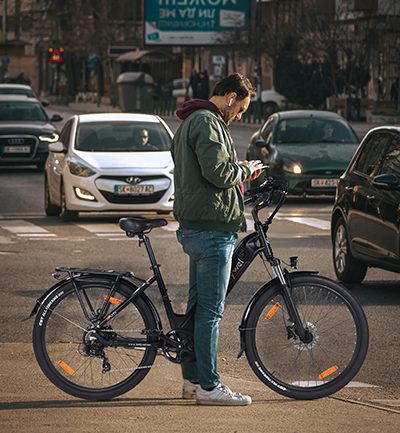As the world grapples with climate change, urban congestion, and the need for sustainable living, the way we move from place to place is undergoing a significant transformation. Enter the e-bike—a revolutionary mode of transportation that combines convenience, efficiency, and environmental friendliness. In this blog post, we’ll explore why e-bikes are not just a passing trend but a key component of the future of commuting.
The Environmental Impact of Traditional Commuting
Transportation is one of the largest contributors to global greenhouse gas emissions, with cars and motorcycles being major culprits. In urban areas, traffic congestion exacerbates the problem, leading to increased fuel consumption and air pollution. Public transportation, while better than individual cars, still relies heavily on fossil fuels in many regions.
This is where e-bikes come in. By offering a clean, energy-efficient alternative, e-bikes are helping to reduce our reliance on polluting vehicles and paving the way for a greener future.
How Ebikes Help the Planet
Zero Emissions
Ebikes run on electricity, which means they produce no tailpipe emissions. Even when accounting for the electricity used to charge the battery, the carbon footprint of an e-bike is significantly lower than that of a car or motorcycle.
Energy Efficiency
E-bikes are incredibly energy-efficient. On average, an e-bike uses about 100-150 watt-hours of electricity per mile, compared to a car, which uses around 400-500 watt-hours per mile. This makes e-bikes a far more sustainable option for short to medium-distance travel.
Reduced Traffic Congestion
By replacing car trips with e-bike rides, we can reduce the number of vehicles on the road, easing traffic congestion and lowering overall emissions. Ebikes also take up less space, making them ideal for crowded cities.
Sustainable Manufacturing
Many e-bike manufacturers are prioritizing eco-friendly materials and production processes. From recycled aluminum frames to biodegradable packaging, the industry is making strides toward sustainability.
The Benefits of Ebikes for Commuters
Beyond their environmental advantages, e-bikes offer a host of benefits that make them an attractive option for daily commuting:
Cost Savings
E-bikes are far cheaper to operate than cars. With no need for fuel, insurance, or expensive maintenance, e-bikes can save you hundreds—if not thousands—of dollars each year.
Time Efficiency
In urban areas, e-bikes can often get you to your destination faster than cars or public transportation. They allow you to bypass traffic, take shortcuts, and avoid the hassle of parking.
Health and Fitness
While e-bikes provide pedal assistance, they still require physical activity, making them a great way to incorporate exercise into your daily routine. You can choose how much effort to put in, making it accessible for all fitness levels.
Convenience
E-bikes are easy to park, require no special license, and can be charged at home or work. Many models also come with practical features like racks, lights, and fenders, making them perfect for commuting.
Ebikes and Urban Planning
Cities around the world are recognizing the potential of e-bikes to transform urban transportation. Many are investing in bike lanes, bike-sharing programs, and charging infrastructure to support the growing number of e-bike users.
For example, cities like Amsterdam and Copenhagen have long been known for their bike-friendly infrastructure, and now others, such as Paris and New York, are following suit. By prioritizing cycling infrastructure, these cities are not only reducing emissions but also creating healthier, more livable urban environments.
The Role of Technology in Ebikes
Advancements in technology are making e-bikes smarter, more efficient, and more accessible. Here are some of the latest innovations:
- Longer-Lasting Batteries: Modern lithium-ion batteries offer longer ranges and faster charging times, making e-bikes more practical for everyday use.
- Smart Features: Many e-bikes now come with GPS tracking, smartphone integration, and even theft prevention systems.
- Lightweight Designs: Improved materials and engineering have led to lighter, more durable e-bikes that are easier to handle and transport.
- Regenerative Braking: Some e-bikes feature regenerative braking systems that recharge the battery while you ride, further enhancing their efficiency.
Overcoming Barriers to Adoption
Despite their many benefits, some people are still hesitant to switch to e-bikes. Common concerns include:
Cost: While the upfront cost of an e-bike can be higher than a traditional bicycle, the long-term savings on fuel, parking, and maintenance often outweigh the initial investment.
Range Anxiety: Modern e-bikes offer ranges of 20-80 miles on a single charge, making them suitable for most commutes. Plus, charging stations are becoming more widespread.
Safety: With proper safety gear, adherence to traffic laws, and the use of bike lanes, biking can be a safe and enjoyable experience.
The Future of Commuting is Electric
As we look to the future, it’s clear that e-bikes will play a crucial role in shaping sustainable transportation. They offer a practical, eco-friendly solution to many of the challenges we face today, from reducing emissions to improving urban mobility.
Governments, businesses, and individuals all have a part to play in accelerating the adoption of e-bikes. By investing in infrastructure, promoting awareness, and choosing e-bikes over cars, we can create a cleaner, greener, and more efficient world.
Join the Ebike Revolution
The shift toward eco-friendly commuting is already underway, and e-bikes are leading the charge. Whether you’re a seasoned cyclist or new to the world of biking, there’s never been a better time to embrace the e-bike revolution.
So, why not give it a try? Swap your car for an ebike on your next commute, and experience the benefits for yourself. Together, we can pedal toward a brighter, more sustainable future—one ride at a time.


